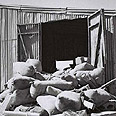

This past weekend I participated in the making of a new kbbutz: The first kbbutz of the Global Jewish People. It’s called KolDor -“the voice of every generation," and for full disclosure, I’m a member.
The first kibbutzim in Israel were task forces for the Zionist revolution. The new kibbutzim will hopefully serve as task forces for carrying out the Peoplehood revolution.
The first kibbutzim were small communities of young people, no more than a few dozen, who carried out the most critical tasks of Zionism, all at once: settling the land; working the land; defending the land and absorbing aliyah. These kibbutzim were state-building task forces, focused, committed and effective. For a few decades, a few thousand people carried on their shoulders a massively disproportionate share of the burden of the Zionist enterprise.
The KolDor kibbutz, still in its infancy, is a small community of 135 members from all over the Jewish world - Israel, the U.S., Canada, France, the U.K., Latin America, eastern Europe, Australia - who have taken upon themselves to serve the Jewish people by carrying out the main tasks required for its success in an age of globalization.
Jews by birth, choice
What are these tasks? They are the tasks needed to build a strong, unified, global Jewish People such that it will answer the need of the next generation of Jews around the world to find meaning and a sense of belonging in an open world of almost infinite choice.
Jews around the world today may be Jews by birth. But even so, they still want to be Jews by choice. They want a good answer to the question, “Why be Jewish?” and "Why belong to the Jewish People?" In the most basic sense, they want to know, “What’s in it for me?”
Religious practice, Zionism, aliyah, and fundraising are no longer good enough. They don't provide answers to the new questions of today. Peoplehood - the widest umbrella, the global community of the Jews - is the only chance we have at finding a good answer.
So what is needed to build Peoplehood? We need to build the institutional and technological infrastructure for a global people that can mobilize effectively to meet the challenges and opportunities of globalization; we need to unleash a tidal wave of innovation and creativity to create the norms, calendar, symbols, and traditions of Peoplehood; we need to connect Jewish individuals around the world and Jewish communities around the world physically and virtually; we need to mobilize the human rather than just the financial resources of the Jewish people and to do so in the service of the betterment of the world at large, and we need to find uniquely Jewish answers to the moral dilemmas of a global information-based flattened world.
These are the tasks that will have to be fulfilled by the new Peoplehood kibbutzim. As was the case in the early kibbutzim this will be done through an ongoing combination of reflection and action.
The first kibbutzim in Israel adopted a socialist way of life because it served well the need to foster solidarity among people who devoted their lives for a revolutionary cause. Socialism was not the purpose of the kibbutzim. Zionism was. Socialism helped. The KolDor kibbutz is not socialist, but it, too, aims to create a model for a new model society in the Jewish people that is governed by a strong ideology of equality and partnership: equality of Jews and Jewish communities around the world around a true Jewish roundtable; deep and true respect for a wide variety of Jewish forms of expression; and creation of opportunities for Jewish service in the name of a greater cause and the world at large.
KolDor’s vision of the model society of the Jewish People is one of a single people, global and connected. One that is able to transcend value-loaded and judgmental divisions between Israel and “Diaspora,” between religious denominations, and religion and secularism - not by ignoring these divisions, but by creating a new space where these divisions do not matter.
A people that builds on shared values - not only on shared fears and devastating memories - and put forth a compelling positive vision of Jews who are engaged in this world, and committed to its universal improvement from within their unique culture.
The Zionist tasks that the kibbutzim set out to carry out have been achieved. The state is built, the land is settled, the army is strong, millions of Jews live in Israel, and the country is rich. But the work of the Jewish People is never complete.
New times call for new answers. KolDor is building a new kind of taskforce to serve the Jewish People globally. We can only hope that from our modest beginnings we will be as successful as those early taskforces of Zionism - the kibbutzim.















